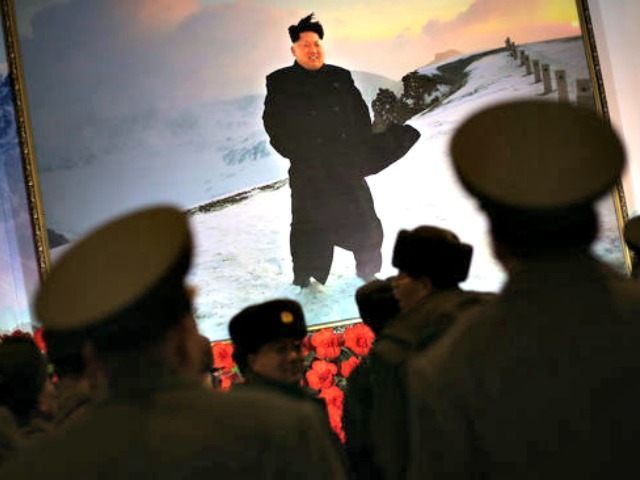A Chinese major general has condemned North Korea for its “ungrateful behavior” towards China, in yet another sign that Pyongyang’s most powerful ally is losing patience with the rogue communist regime.
Speaking to a Hong Kong-based magazine, Major General Qiao Liang – who UPI describes as “an influential Chinese air force general and writer” – noted that the Kim Jong-un regime had begun to make Beijing “uncomfortable” with its continuous military tests and violations of international sanctions. This year alone, Kim has commissioned the testing of what his government claims was a hydrogen bomb (most experts disagree) and a “satellite” many considered a ballistic rocket test. The Chinese government has responded with concern to these military provocations, as they may destabilize a region and tarnish China’s reputation, given its status as North Korea’s number one economic partner.
“For the last half-century all China did to influence North Korea was to provide unconditional aid, with no strings attached,” Qiao told Hong Kong’s Zijing magazine. “North Korea used to concern itself with China’s reactions but now they don’t accept our demands, and our influences seem to be diminishing.” He added that North Korea must change its “ungrateful behavior” and act as China would demand it to, as Beijing “absolutely will not tolerate this attitude of North Korea.”
As one of the few nations in the world to have any diplomatic relations with North Korea, China has come under fire for not doing enough to curb Kim Jong-un’s human rights abuses and ambition to expand the nation’s weapons arsenal. Qiao did not go so far as to place any responsibility on China for curbing this behavior, instead parroting the Chinese party line that “the key to the North Korea nuclear issue lies in U.S. hands, and that China’s hands are tied,” UPI notes.
Chinese state media has previously decreed North Korean denuclearization a “U.S. obligation” that China should have no role in, arguing that “the U.S. should not always try to outsource its problems to China.”
Chinese officials in the past have stated, however, that the nation “will never accept North Korea as a nuclear-possessing country” and that Beijing will have an active role in curbing North Korean belligerence.
North Korea has nonetheless become a growing problem for China, particularly as President Xi Jinping has worked to strengthen ties between Beijing and Seoul. Xi welcomed South Korean President Park Geun-hye to Beijing for China’s World War II victory anniversary celebration in September, a move that greatly angered Pyongyang.
North Korea has repeatedly called President Park a “bitch,” “ugly old maid,” “cold-blooded animal,” “witch full of hatred,” and other epithets. Today, North Korea’s Rodong Sinmun state newspaper speculated that Park “looks depressed” and “has gone mad,” claiming that her supporters “are shaking their heads, saying that they chose her as a ‘president’ by mistake.” The newspaper cites no sources to corroborate these claims.
China has nonetheless kept its relationship with South Korea cordial. Chinese nuclear envoy Wu Dawei is currently in Seoul, and met this week with senior South Korean officials to discuss demilitarization of the region. While China has increasingly supported South Korea’s actions against the North, it is seeking to persuade Seoul not to purchase a Terminal High Altitude Area Defense (THAAD) missile system South Korea is seeking to buy from the United States to protect against a North Korean nuclear attack. According to a South Korean ministry official speaking to news agency Yonhap, Wu “greatly emphasized that China values the strategic cooperative partnership between South Korea and China,” arguing that the THAAD system would be as much a threat to China as any other country in the region.
Wu also visited South Korea to discuss proposed United Nations sanctions on North Korea, which the United States seeks to introduce for a vote to the UN Security Council on Tuesday. China actively participated in drafting the new sanctions, which the New York Times notes would “subject cargo ships leaving and entering North Korea to mandatory inspections” and prevent North Korea from purchasing a number of luxury goods from abroad. Chinese Foreign Minister Wang Yi worked on the draft sanctions resolution with White House National Security Adviser Susan Rice during his visit to Washington last week. President Obama is said to have “dropped in” on the meeting.
The government of Russia has stalled a vote on the sanctions, believed to be the only nation not certain to vote in their favor. A report in the UPI newswire service claims there is evidence that North Korea is actively selling Russian fuel oil in Chinese territory, violating existing UN sanctions.

COMMENTS
Please let us know if you're having issues with commenting.